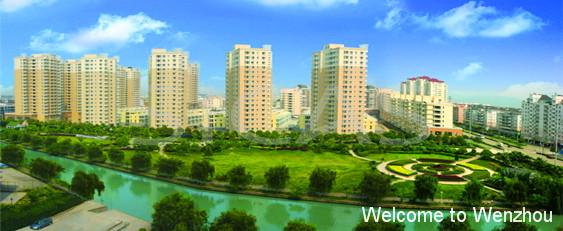
Brief Introduction to Wenzhou Economy
Wenzhou exports food, tea, wine, jute, timber, paper, Alunite (a non-metallic mineral used to make alum and fertilizer). Alunite is quite abundant here and sometimes Wenzhou claims to be the "Alunite Capital of the World".
Its main industries are food processing, papermaking, and building materials, with some engineering works producing mostly farm machinery. In the early days of economic reforms, the people of Wenzhou took the lead in developing a commodity economy, household industries and specialized markets. Many thousands of people and families were engaged in household manufacturing to develop individual and private economy.
Up till now, Wenzhou has a total of 240,000 individually-owned commercial and industrial units and 130,000 private enterprises of which 180 are group companies, 4 among China’s top 500 enterprises and 36 among national 500 top private enterprises.
The development of private economy in Wenzhou has created the “Wenzhou Economic Model”, which inspires the modernization drive in China.
Financial Reform Pilot Project
In late March 2012 China's State Council announced that Wenzhou would be the site of a pilot project for the reform of private investment rules. The city had been a significant source of illegal loans, and this project would legalize and provide a regulatory framework for such activities. It has been seen not only as an attempt to legitimize Wenzhou's private finance market, but as a model for cleaning up underground lending in China as a whole.
Birthplace of China's private economy
In the early days of economic reforms, the people of Wenzhou took the lead in developing a commodity economy, household industries and specialized markets. Many thousands of people and families were engaged in household manufacturing to develop individual and private economy. Up till now, Wenzhou has a total of 240,000 individually owned commercial and industrial units and 130,000 private enterprises of which 180 are group companies, 4 among China’s top 500 enterprises and 36 among national 500 top private enterprises. There are 27 national production bases such as "China’s Shoes Capital" and "China’s Capital of Electrical Equipment", China’s 40 famous trademarks and China’s famous-brand products and 67 national inspection-exempt products in the city. The development of private economy in Wenzhou has created the "Wenzhou Economic Model", which inspires the modernization drive in China.
The city of Wenzhou is a world leader in lighter manufacturing with over 500 such companies in the city.The plastic weaving cluster in Wenzhou comprised 1600 enterprises in 2001, employing 42,000 people with an annual output value of 20 billion Yuan. The Local cluster comprised 400 manufacturers in 2001 with a total output of 5 billion Yuan, representing 65 percent of the domestic market share. The cluster is the first in China in terms of market share and sold it products to 60 countries.
There are many areas in which people of Wenzhou opened the first example of private economy in post-1949 China. For instance, Juneyao Airlines started on July, 1991, which is the first private airline company in China. Jinwen Rail Way is also the first rail way company which is built with private capital.
Wenzhou Economic & Technological Development Zone
Wenzhou Economic & Technological Development Zone was established and approved by State Council in 1992. The main traffic system around the zone include No.104 National Highway, Ningbo-Wenzhou Expressway and Wenzhou Bridge. It is located near to Wenzhou International Airport and Wenzhou Port. Industries encouraged in the zone include electrical equipment, electronic information, chemical medicine, building materials, and textiles.









